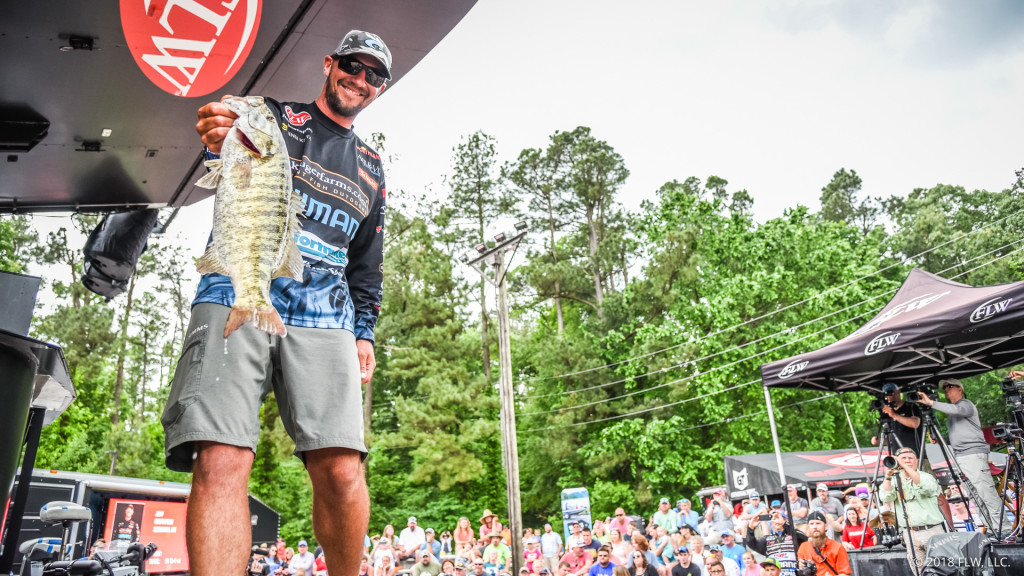A Canadian Fishing in the U.S.

I live in Kenora, Ontario, on the shores of Lake of the Woods – one of the best multi-species fisheries in the world. Kenora is located about seven hours north of Minneapolis, so we get real winter weather. Because of that, my bass fishing is limited to a short time frame when there’s open water. As much as I love ice-fishing around home in the winter, heading south to catch bass was an idea too tempting to pass up when I first considered it. In 2013 I started fishing the FLW Tour, which gave me the awesome opportunity to fish in warm weather and on open water, and catch bass.
Even after a few years of traveling around the U.S. on Tour, I still find it funny when I’m down South and a local weather report mentions International Falls, Minn. It’s used for comparison because it’s one of the coldest cities in the country – and I live two hours north of there! We get four or five feet of snow and over three feet of ice on our lakes, which are frozen from late November to late April most years. You can drive a truck all over on our lakes during the winter. Not exactly bass-fishing paradise, right?
In reality, it is indeed a bass-fishing paradise throughout the open-water season. Many folks consider northern bass to be dumb, but when you’ve only got half a year to eat, it makes you smarter. While bass back home go practically dormant during the winter, when the ice breaks it’s time for them to eat. So even though we have a short season up north, we have excellent fishing for both smallmouths and largemouths on a variety of waters. That helps us be versatile anglers.
I’ve read interviews of my pals and fellow FLW Tour competitors Chris and Cory Johnston where they say they feel their skills are fairly well-rounded because we get to fish shallow and deep, in clear water and not so clear, in grass and in rivers and lakes. When we head south in the winter, we do so having experience with a variety of techniques to catch bass.
As a year-round fishing guide at home, I fish for several other species, which I think helps to keep me more versatile as well. We do a lot of walleye fishing, which gives me experience fishing offshore and using my electronics; we fish for pike and muskies, which gives me some experience fishing with big baits; and we ice-fish a lot where we always use sonar to watch our baits and see how fish react to them. All of this stuff helps to keep a guy sharp, for sure.
In the six years that I have been on Tour there have certainly been some instances where I’ve been out of my element and had my butt whipped, but those situations have helped me learn and I’m getting better at avoiding the bombs, though I still manage to mix in the odd one here and there.
Shad spawns – there’s one example of learning as I go. Where I live in northwest Ontario, we don’t have shad, which is the primary forage in many Southern waters, so I’ve had to figure out the shad spawn and some of the nuances that bass feeding on them have.
We also don’t have spotted bass in Canada, but they have many similarities to our smallmouths and I have really enjoy fishing the good spotted bass lakes that we frequent on Tour. You can always find some spots in deep water offshore and I have figured out a few tricks that have helped me have great events over the years on Hartwell, Lanier and Lewis Smith in particular.
Another major difference is that most of our lakes back home are natural, as opposed to the reservoirs where most of our events are in the South. There has been a bit of a learning curve there too, such as taking into account current that goes on and off, and fishing in standing timber and stump fields – something we don’t really have Up North.
At the end of the day, the old saying “a bass is a bass” rings true much of the time as they are usually related to some type of structure or cover and they always display similar predictable movements depending on the time of year. So while I don’t get to be in a boat all the time or get to catch bass all year long, it doesn’t mean I’m not learning something that helps me keep up with the other guys on Tour.